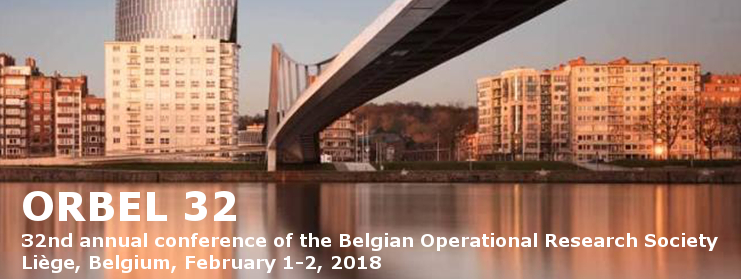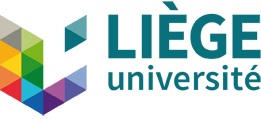 |
| |

|
|
| |
|
Schedule
Click on a link for more details
Show all the abstracts
Download the booklet of abtracts
Thursday 11:00 - 12:20 Routing Problems
Room 138 - Chair: Pieter Vansteenwegen
Thursday 11:00 - 12:20 Emergency operations scheduling
Room 130 - Chair: El-Houssaine Aghezzaf
Thursday 11:00 - 12:20 Algorithm design
Room 126 - Chair: Gerrit Janssens
Thursday 11:00 - 12:20 Multiple Objectives
Room 120 - Chair: Filip Van Utterbeeck
Thursday 13:30 - 14:50 Integrated logistics
Room 138 - Chair: Kris Braekers
Thursday 13:30 - 14:50 Person transportation
Room 130 - Chair: Célia Paquay
Thursday 13:30 - 14:50 Continuous models
Room 126 - Chair: Nicolas Gillis
Thursday 13:30 - 14:50 Integer programming
Room 120 - Chair: Bernard Fortz
Thursday 15:20 - 16:20 Material handling and warehousing 1
Room 138 - Chair: Greet Vanden Berghe
Thursday 15:20 - 16:20 Operations management
Room 130 - Chair: Roel Leus
Thursday 15:20 - 16:20 Matrix factorization
Room 126 - Chair: Pierre Kunsch
Thursday 16:30 - 17:10 Material handling and warehousing 2
Room 138 - Chair: Katrien Ramaekers
Thursday 16:30 - 17:10 Routing and local search
Room 130 - Chair: An Caris
Thursday 16:30 - 17:10 Traffic management
Room 126 - Chair: Joris Walraevens
Thursday 16:30 - 17:10 Pharmaceutical supply chains
Room 120 - Chair: Bart Smeulders
Friday 10:50 - 12:10 Optimization in health care
Room 138 - Chair: Jeroen Beliën
Friday 10:50 - 12:10 Network design
Room 130 - Chair: Jean-Sébastien Tancrez
- Considering complex routes in the Express Shipment Service Network Design problem
José Miguel Quesada PÉrez (Université catholique de Louvain)
Co-authors: Jean-Charles Lange, Jean-Sébastien Tancrez
- Assessing Collaboration In Supply Chain
Thomas Hacardiaux (Université catholique de Louvain)
Co-authors: Jean-Sébastien Tancrez
- Planning of feeding station installment and battery sizing for an electric urban bus network
Virginie Lurkin (École polytechnique fédérale de Lausanne)
Co-authors: A. Zanarini, S.S. Azadeh, Y. Maknoon, M. Bierlaire
- A matheuristic for the problem of pre-positioning relief supplies
Renata Turkes (University of Antwerp)
Co-authors: Kenneth Sörensen, Daniel Palhazi Cuervo
Abstract:
Every year millions of people around the world are affected by natural and man-made disasters. No country is immune from the risk of disasters, but much human loss can be avoided by preparing to better deal with these emergencies. Pre-positioning emergency supplies at strategic locations is a mechanism to increase preparedness for disasters, as it makes the critical supplies such as water, food or medicine readily available to the people in need. To solve the pre-positioning problem is to develop a strategy that determines the number, location and size of storage facilities, the quantities of various types of emergency supplies stocked in each facility and the distribution of the supplies to demand locations after an event, under uncertainty about demands, survival of pre-positioned supplies and transportation network availability. Despite a growing scientific attention for the pre-positioning problem, there still does not exist a set of benchmark instances what hinders thorough hypotheses testing, sensitivity analyses, model validation or solution procedure evaluation. Researchers therefore have to invest a lot of time and effort to process raw historical data from several databases to generate a single case study that is nonetheless hardly sufficient to draw any meaningful conclusions. By carefully manipulating some of the instance parameters, we generated 30 diverse case studies that were inspired from 4 instances collected from the literature. In addition, we developed a tool to algorithmically generate arbitrarily many random instances of any size and with diverse characteristics. The case studies and the random instance generator will be made publicly available to hopefully foster further research on the problem of pre-positioning relief supplies. Since the problem become intractable for any of the instances of reasonable size, we developed a matheuristic that employs iterated local search techniques to look for good location and inventory configurations and uses CPLEX to find the optimal solution of the aid distribution sub-problem. Numerical experiments on the set of instances we generated show that the matheuristic outperforms CPLEX for any given computation time, especially for large instances.
Friday 10:50 - 12:10 Local search methodology
Room 126 - Chair: Patrick De Causmaecker
Friday 10:50 - 12:10 ORBEL Award
Room 120 - Chair: Frits Spieksma
Friday 13:00 - 14:00 Production and inventory management
Room 138 - Chair: Tony Wauters
Friday 13:00 - 14:00 Logistics 4.0
Room 130 - Chair: Thierry Pironet
Friday 13:00 - 14:00 Data clustering
Room 126 - Chair: Yves De Smet
Friday 13:00 - 14:00 Collective decision making
Room 120 - Chair: Bernard De Baets
Friday 14:10 - 15:10 Sport scheduling
Room 138 - Chair: Dries Goossens
Friday 14:10 - 15:10 Discrete choice modeling
Room 130 - Chair: Virginie Lurkin
Friday 14:10 - 15:10 Data classification
Room 126 - Chair: Ashwin Ittoo
|
|
| |
ORBEL - Conference chair: Prof. A. Arda -
Platform: Prof. M. Schyns.
|
|
 |
|





